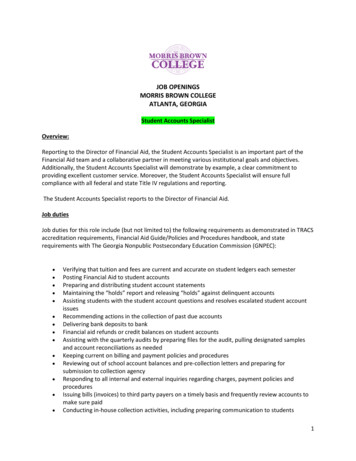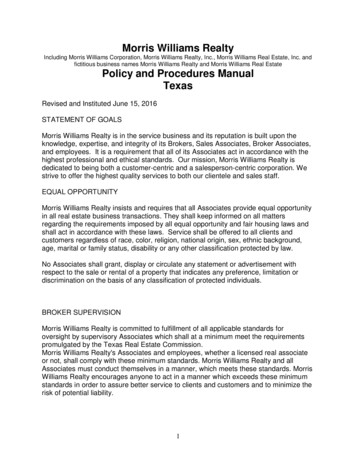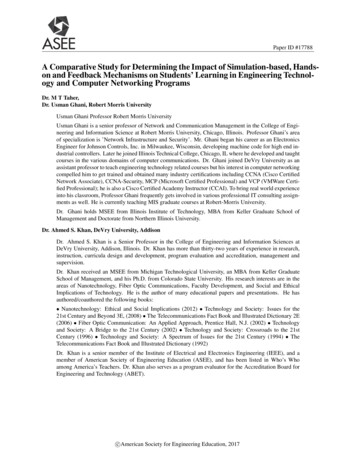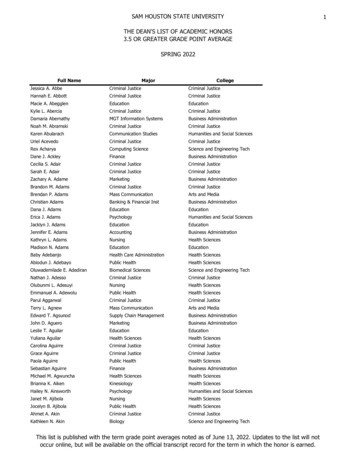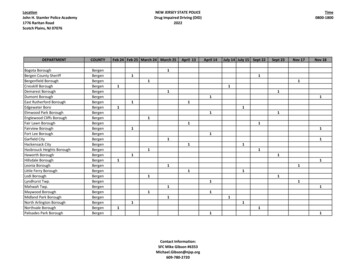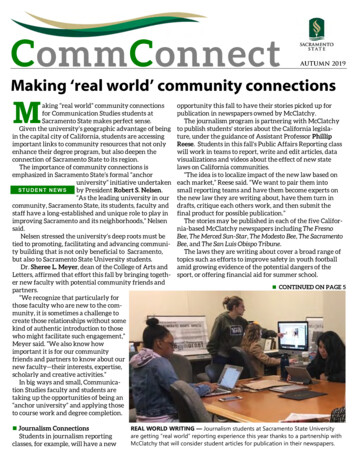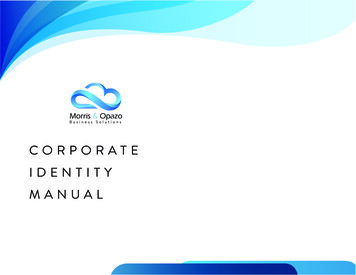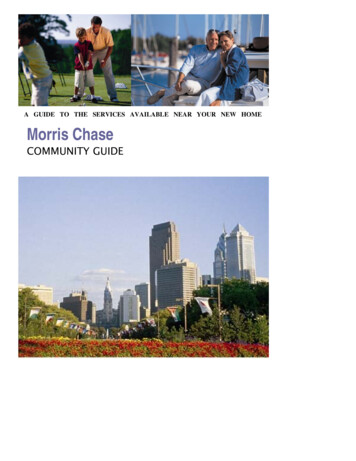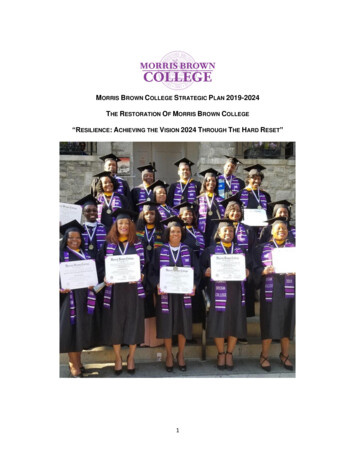
Transcription
MORRIS BROWN COLLEGE STRATEGIC PLAN 2019-2024THE RESTORATION OF MORRIS BROWN COLLEGE“RESILIENCE: ACHIEVING THE VISION 2024 THROUGH THE HARD RESET”1
Table of ContentsOffice of the President . 3Executive Summary . 4History. 5Mission/ Purpose/ Faith Statement.6Core Values .8Morris Brown’s Plan to Build a Hotel.9Enrollment Plan . 10Institutional Goals, Objectives, and Metrics. 11Financial Resources to Meet Strategic Goal. 17Strategic Planning Process.17Board of Trustees.212
Office of the President“Strive for the Highest”Morris Brown College (MBC) is truly at a crossroads in its history. The institution is diligently working to reemerge to itsprominence, utilizing strategic planning, which will lead to accreditation and sustainability. This strategic plan sets thestandard for how we intend to reach our goals. To accomplish our goals, we have identified six strategic priorities:1. Institutional Sustainability: through gaining accreditation and developing sustainable resources that enable theachievement of the College’s mission;2. Strategic Enrollment Management: by practicing effective enrollment management to optimize student access,retention, program completion and success through relevant programming, high-quality instruction, and comprehensiveeducational support services;3. Organizational Excellence: through promoting an organizational culture that encourages excellence and success bydeveloping and supporting individuals, teams, and processes that contribute to the effective and responsible managementof teaching and learning, student success, human resources, facilities, services, technology, and finances;4. A Market Responsive Institution with Innovative Academic Programs by strengthening existing market-relevantprograms and developing workforce development, continuing education, and professional education programs to prepareits students with 21st century skills;5. Technology and Integrated Learning Space: by strengthening our technology infrastructure to provide educational andworkforce opportunities, improve student access and utilization, and advance the College’s operational effectiveness; and6. Maximizing Strategic Partnership Opportunities: by expanding our brand, which is mission critical to ensure the successand sustainability of our institution, as strategic partnership opportunities are pivotal to increasing our visibility in thecommunity and scaling reach and impact.As an institution “Founded in Service Grounded in Excellence and Anchored in Tradition,” we have carefully updated ourstrategic plan. With the leadership of a willing steering committee of trustees, administrators, faculty, staff, students andalumni, the pathway to excellence has produced a re-aligned mission and vision within the existing framework of guidingprinciples and six strategic priorities. These priorities will serve as the heart of what we intend to be as a premierinstitution of higher learning.“Resilience: Achieving the Vision 2024 through The Hard Reset” exemplifies our pathway to success. Morris Brown Collegeis ready to reengage and position itself and fulfill its obligation as an accredited innovative institution, ready to make adifference for all that enter the doors of this historic haven for hungry souls.Sincerely,Dr. Kevin E. James, President3
Executive SummaryHistorically Black Colleges and Universities (HBCUs) have served as the beacon of inspiration, hopes and dreams actualizedfor descendants of enslaved Africans who involuntarily migrated to North America. It has been grit and perseverance thathas allowed these institutions to sustain and continue to impart knowledge and invaluable life lessons for our students tobe productive, contributing and responsible citizens. Now in the 21st century, challenges continue to abound and withtechnology, there are new obstacles for these institutions and their matriculating students and alumni including the costof attending and finding employment. There are eight strategic issues facing HBCUs including accreditation, educationalquality and degree offerings, enrollment and the value proposition, student success and completion, finances andaffordability, infrastructure, federal and state policy, and governance and leadership. Moreover, the relevance of HBCUis a frequent conversation. The Morris Brown College Strategic Plan, “Resilience: Achieving the Vision 2024 Through TheHard Reset”, is designed to address these challenges through six strategic priorities.Institutional Sustainability: The national conversation on HBCUs revolves around its value proposition and relevance in anera of more opportunities for African Americans to attend Predominately White Institutions. Morris Brown College isstrategically positioning itself in the direction of developing sustainable resources that enable the achievement of thecollege’s mission by optimizing its financial profile, achieving institutional accreditation, improving Board effectiveness,creating a campus environment that supports intellectual inquiry and placing the college in a place of space andopportunity where the brand image of our academic enterprise represents a beacon of academic prosperity.Strategic Enrollment Management: No longer are the traditional students, the “traditional students.” They now areworking adults with jobs and family responsibilities and returning veterans. HBCUs will be impacted the greatest asopportunities for those students who traditionally attended HBCUs now have more choices and are often aggressivelyrecruited by other types of institutions that can offer greater financial packages and resources. Morris Brown College mustnow strategically position itself in the marketplace to attract, recruit, enroll and retain students through a sound strategicenrollment management model.Market Responsive Institution: The type, number, mode of delivery, and quality of program offerings at MBC is anessential strategic consideration in developing the strategic plan. MBC must strategically position itself to be nimble andagile in responses to the market; offering degree programs and other educational opportunities that students want andthe work industry needs.Organizational Excellence: Our work is important to the Mission and Vision of the College, and all employees areencouraged and provided the tools and support they need to produce excellence. Students have an overabundance ofoptions; they choose to come to Morris Brown College for a reason. MBC will build a comprehensive workforceinfrastructure by attracting, recruiting, hiring and retaining quality staff, faculty and instructional support staff, who arerecognized and celebrated for their contributions to the College and are valued as individuals.Technology and Integrated Learning Space: Going beyond access points and internet speed, institutions of higher learningmust extend the strategic conversation to virtual course delivery, online registration, financial aid, student advising,qualified and a skilled technology workforce. Technology initiatives must support the learning environment. An agiledigital strategy to increase operational effectiveness, student access to college and improve student learning experiencesis a top priority of Morris Brown College.Maximizing Strategic Partnership Opportunities: The MBC campus footprint is a major strategic conversation piece withthe Board of Trustees. Combined real estate development, business development and education/training/workforcedevelopment will help build a sustainable future for (a) the college in terms of new academic programs and (b) the underserved communities where employment can be provided. MBC will invest in coordinated strategic, long-term partnershipswith businesses to increase the persistence of undergraduate students toward degree attainment and preparation for the21st century workplace.4
Morris Brown College HistoryHistory of Bishop Morris BrownBishop Morris Brown, was one of the founders and the “second consecrated bishop of the African Methodist EpiscopalChurch.” Brown was central to the establishment and direction of an institution that has played an important role in theeducation of Black people over the course of United States history. Morris Brown was born into one of the few free Blackfamilies in Charleston, South Carolina in 1770, just before the American Revolution. In 1818, two years after collaboratingwith the Rev. Richard Allen in the founding of the country’s first African Methodist Episcopal Church (AME), “Brown left aracially segregated Methodist Church in Charleston in protest against discrimination,” drawing “more than 4,000 Blackmembers” to his new congregation. In 1822, Brown and the Charleston A.M.E. Church were investigated for their ties to aplanned slave revolt. In addition, Brown was “reported to have been imprisoned for one year for helping many slaves topurchase their freedom.” Afterward, Brown relocated to Philadelphia, eventually rising to become the second bishop ofthe A.M.E. Church. While Brown was himself illiterate, having “never been formally educated,” as a bishop, he was “alwaysa proponent of education. Morris Brown’s explicit support for and recognition of the importance of education paved theway for the establishment of A.M.E. affiliated Black colleges over the course of the late 19th century. Brown’s legacy, whichstands at the intersection of faith, knowledge, and racial uplift, is reflected in the mission and works of Morris BrownCollege, and is one of the institution’s major strengths.Morris Brown College HistoryIn the early 1880’s the country was nearing the end of a period of reconstruction after a war that divided the nation.Unification and healing were required to move forward. In this atmosphere, a group of Clark College trustees soughtsupport from Big Bethel AME church in Atlanta to furnish a room for their institution; but layman Steward Wiley said, “Ifwe can furnish a room for Clark College, why can't we build a school of our own?” These words ignited a flame in the mindof Reverend Wesley John Gaines. On January 5, 1881, during the North Georgia Annual Conference at Big Bethel, heintroduced a resolution calling for the establishment of an institution for the moral, spiritual and intellectual growth ofNegro boys and girls. It was out of this vision a foundation was cured on self-determination - Morris Brown College.The church established Morris Brown College’s philosophical thrust and created a system of nurturing support to channelits early energies toward developing programs to serve the needs of students. Its historic founding in the Christian beliefsystem provided an opportunity for students of varying abilities to actualize their spiritual, academic, and vocationalpotential.Morris Brown College expanded its curriculum over the early 20th century while cultivating a reputation as a school thatcould educate and uplift the most economically and socially disadvantaged students. The institution faced a seriouschallenge in 2002 when the Southern Association of Colleges and Schools – Council of Colleges (SACS-COC) denied thecollege’s accreditation membership due to fiscal irregularity. For the next six years, enrollment dropped from almost 3,000students to under 200, while debt mounted.Through fortitude, Morris Brown College now has a new-found path through new board leadership and a President who issteadfast in restoring the college to an academic citadel of innovation and discovery. He is committed to developing ablueprint for a future secured by the school’s rich history, tempered by realistic constraints, while focusing on serving thespecific needs of the higher education community. The new Morris Brown College, with its extraordinary legacy combinedwith current innovative initiatives, will attract students who will benefit from the old and the new.“Resilience: Achieving the Vision 2024 Through The Hard Reset” is a living document that serves the needs and aspirationsof the college and its stakeholders; and is the culmination of the hard work of faculty, staff, administrators, alumni,trustees and community stakeholders, who all have a vested interest in the success of Morris Brown College.5
Mission/MorrisPurpose/Brown CollegeFaith StatementHistoryMorris Brown College was founded on Christian principles in 1881 by the African Methodist Episcopal Church and ischartered by the State of Georgia as a private, coeducational, liberal arts college engaged in teaching, research, and publicservice in the arts, humanities, social and natural sciences, and professional programs.MissionThe mission of Morris Brown College is to provide educational opportunities in a positive and nurturing environment thatwill enable its students to become fully functional persons in our global society. The College prepares graduates to livemeaningful and rewarding lives, thereby enabling them to make socially constructive and culturally relevant contributionsto society.Morris Brown College, in its commitment to academic excellence, provides experiences that foster and enhanceintellectual, personal, and interpersonal development for students who have demonstrated the potential to compete in achallenging undergraduate liberal arts program of study.PurposeBecause the most universal criterion by which Morris Brown College and any other institution may be measured is theachievement of its alumni, the College seeks to provide its students with the following:-An environment that will foster the development of wholesome attitudes and a full appreciation for the cultural heritageof the human race epitomized in the major intellectual and/or cultural disciplines- Our core values bind us together. Theyare deeply held beliefs which we translate into consistent standards of behavior when working with our students and eachother.Faith StatementCollege Seal and Motto: To God and TruthFaith Statement: Morris Brown College hereby affirms its historical affiliation with the African Methodist Episcopal Church(AME). In fulfillment of its mission as an institution of higher education, steeped in the foundational beliefs of The AMEChurch; Morris Brown College is committed to the motto of “God Our Father, Christ Our Redeemer, the Holy Spirit OurComforter, Humankind Our Family.”The Apostle’s CreedI believe in God the Father Almighty, Maker of heaven and earth, and in Jesus Christ his only son our Lord who wasconceived by the Holy Spirit, born of the Virgin Mary, suffered under Pontius Pilate, was crucified, dead; and buried. Thethird day he arose from the dead’ he ascended into heaven and sits at the right hand of God the Father Almighty; fromthence he shall come to judge the quick and the dead. I believe in the Holy Spirit, the Church Universal, the communion ofsaints, the forgiveness of sins, the resurrection of the body and the life everlasting.Foundational BeliefsThe Trinity: There is but one living and true God, everlasting, without body or parts, of infinite power, wisdom, andgoodness; the Maker and Preserver of all things, both visible and invisible. And in unity of this God-head, there are threepersons of one substance, power and eternity - the Father, the Son and the Holy Ghost. (Article I).6
Deity and Humanity of Christ: The Son, who is the Word of the Father, the very and eternal God, one substance with theFather, took man’s nature in the womb of the blessed virgin; so that two whole and perfect natures, that is to say, theGod-head and manhood, were joined together in one person, never to be divided, whereof is one Christ, very God andman, who suffered, was crucified, dead and buried, to reconcile his Father to us, and to be a sacrifice, not only for originalguilt, but also for actual sins of men. (Article II).The Bible: The Holy Scriptures containeth all things necessary for salvation; so that whatever is not read therein, nor maybe proved thereby, is not to be required of any man, that it should be believed as an article of faith, or be thoughtrequisite or necessary to salvation. In the name of the Holy Scriptures, we do understand those canonical books of the Oldand New Testament, of whose authority was never any doubt in the Church (Article V).Creation: (Genesis 1:1) “In the beginning God created the heavens and the earth, and the sea, and all that in them there is;wherefore, the Lord blessed the Sabbath day and hallowed it.Redemption: Not every sin willingly committed after justification is the sin against the Holy Ghost, and unpardonable.Wherefore, the grant of repentance is not to be denied to such as fall into sin after justification. After we have receivedthe Holy Ghost, we may depart from grace given, and fall into sin, and, by the grace of God, rise again, and amend ourlives. And therefore, they are to be condemned who say they can do no more sin as long as they live here; or deny theplace of forgiveness to such as truly repent. (Article XII)Salvation: We are accounted righteous before God only for the merit of our Lord and Savior, Jesus Christ, by faith, and notby our own works or deserving; wherefore, that we are justified by faith only, is a most wholesome doctrine, and very fullof comfort. (Article IX)Free Will: The condition of man after the fall of Adam is such that he cannot turn and prepare himself by his own naturalstrength and works to faith, and calling upon God; wherefore, we have no power to do good works, pleasant andacceptable to God, without the grace of God; by Christ presenting us, that we may have a good will, and working with us,when we have that good will.AME Church Articles of iefs/7
Core ValuesOur core values bind us together as a college and as a community. They are deeply held beliefs which we translate intoconsistent standards of behavior when working with our students and each other.1. Integrity and Respect: The College manifests an unwavering adherence to strict moral and ethical character and showsan authentic regard for others while practicing civility and supporting all dimensions of the human as a being.2. Diversity and Inclusiveness: We celebrate individual differences and recognize that the inclusion of all is vital for thesuccess of the institution and its ability to support a global agenda.3. Quality Teaching and Learning: We are committed to imparting and gaining knowledge to promote intellectual curiosityin a success-driven environment.4. Excellence: We strive for excellence in all we do. We are committed to providing excellent teaching and service to ourstudents and staff.5. Service to Community: Throughout the College, we support and recognize service that contributes to thebenefit of the college’s student body and its workforce, the State of Georgia, the nation and the world.6. Innovation and discovery: We take the lead and adopt a spirit of innovation and creativity in our work.We are committed to building a robust culture of ingenuity through habits of mind and championing of opportunities toimprove our educational landscape.7. Collaboration: Through collaboration we multiply our contribution. Together, we are stronger, contributing more with ashared sense of goals and mutual support that lead to greater success than isolated work and individual focus. We operateas one cohesive and collegial unit with a unified and student-centered culture.8. Christian Faith: As a practice, our faith is a vehicle of expression of best interest and intentionality. We are consciouslydedicated to the purposeful and intentional expression of God’s revealed truth.8
Morris Brown’s Plan to Build a Hotel and Innovative Conference CenterA unique and potentially lucrative opportunity exists in southwest Atlanta, and Morris Brown College is seeking the rightpartners to capitalize on it.Morris Brown College is planning to develop a hotel and conference center on its campus that would be marketed to thecity’s special event visitors, business travelers, Atlanta University Center, tourists, alumni, students, parents and others.The location is ideal as it is in the heart of five colleges and universities, just steps away from Mercedes Benz Stadium andnot far from the many events and activities in downtown Atlanta. This hotel will be strategically linked as an instructionaland internship venue for the rebirth of Morris Brown’s innovative hospitality and management program.Mercedes Benz Stadium is, of course, home to the Atlanta Falcons and Atlanta United. A few major upcoming eventsinclude the Chick-fil-A game and Peach Bowl, SEC Championship, and the NCAA Men’s Final Four in April 2020. Othernearby venues that house special events that draw large crowds are Georgia World Congress Center and AtlantaConvention Center at AmericasMart.According to the Atlanta Convention and Visitors Bureau, Atlanta has a 15 billion hospitality industry which generated 53million visitors in 2017. Some 750 conventions, meetings and events were held in Atlanta in 2017. Additionally, MorrisBrown College is surrounded by stellar academic institutions: Clark Atlanta University, Morehouse College, MorehouseSchool of Medicine, Spelman College, Interdenominational Theological Center, Georgia State University, Georgia Tech andothers, however, the area is something of a desert when it comes to accommodations. There is only one hotel in theimmediate area.We are seeking partners willing to invest in this hotel and event center with upfront dollars of 10 to 15 million to MorrisBrown College that will be used for operational expenses as well as accreditation requirements for 2020. This hotel andconference center will be majority owned by Morris Brown College.The benefits for investors are many. Federal Opportunity Zones is a new community and economic development tooldesigned to foster long-term private investment into low-income communities throughout the country. Of the 260Opportunity Zones in Georgia, 26 are in the city of Atlanta, and Morris Brown College is located in one of them—theAtlanta University Center zone. A provision of the 2017 tax law, the zones offer companies seven years to defer or reducecapital gains taxes in exchange for their investment in impoverished communities. By partnering with Morris BrownCollege on this project, investors would be eligible for this tax benefit.Morris Brown’s leadership is also open to other business opportunities that will lead to restoration. The goal for the hotelbuild is Fall 2023.CGI Merchant Group, LLC (CGI) has announced it will make a 30 million investment in Morris Brown College to convertexisting campus facilities into a 150-room upscale Hilton hotel and hospitality management training complex. Constructionof the 90,000-square-foot state-of-the-art facility is expected to begin March 2022 and will make Morris Brown theonly Historically Black College and University (HBCU) nationwide with both a flagged hotel and a hospitality managementtraining program on its campus.The time is now to save Morris Brown College and bring vast economic opportunities to the Atlanta Westside community.9
Enrollment PlanThe Morris Brown College Office of Admissions and Records is responsible for the identification and recruitment ofstudents for enrollment in the College. The “target market” for recruitment of students is “Traditional, Non-Traditional,Adult-Degree, Transfer, and Re-Admit Students”. The admissions function is executed in direct response to “theinstitution’s strategic plan,” and thereby, modified as needed, and as directly related to achievement of the institution’soperational goals and objectives.The main purpose of this Enrollment Plan is to increase the total student population at Morris Brown College. The Collegewill broaden the recruitment pool and expand the strategies to interact with a more diverse population of prospectivestudents and thus, realize the fullest potential. Increasing the total student enrollment will give new life, zest and vigor tothe Morris Brown College campus climate, as well as it will provide needed additional revenue for successful collegeoperations.Recruitment strategies will be implemented to attract new students each year during 2019-2024. The College will broadenits recruitment pool of students to enroll 40 students the first year of this plan. The goal is to recruit 300 over the next fiveyears.Goals, Objectives, and ActivitiesGoalsObjectivesRecruit 280 students during2019-2024Year 1, 2019-2020- Maintain25 studentsYear 2, 2020-2021- 35 totalstudentsActivitiesa. Maintain a minimum of 25students during MBC’s unaccreditedperiodb. Become a candidate foraccreditation where students will beeligible for financial aid.c. Hire an experienced, goal drivenSenior Enrollment & Student Servicesleader.Year 3, 2021-2022(Candidate forAccreditation), 65 totalstudentsYear 4, 2022-2023, (Fullaccreditation), 180 totalstudentsYear 5, 2023-2024 (Fullaccreditation), 280 totalstudents101a. Attend college fairs in Atlanta andmetropolitan Atlanta schools andcommunity activities1b. Hold recruitment events oncampus for Atlanta and metropolitanAtlanta students1c. Hold recruitment events oncampus for students from throughoutthe state1d. Attend college fairs in citiesthroughout Georgia including fivemajor cities (Columbus, Savannah,Albany, Macon, and Augusta) andtheir surrounding areas1e. Recruit at church conferencesthroughout the state of Georgia.1f. Web-based recruitment andtelemarketing1g. Strategically target and recruitHispanic and other minority students1h. Strategically utilize alumni torecruit students to MBC
Institutional Goals, Objectives, and MetricsGoal 1. To enroll and retain academically and culturally diverse student populations (ResponsibleDivision: Student Services -Chief Administrator- Dr. James Freddy Allen)Metric: By 2023, the College will achieve an academically diverse student body through a liberaladmissions policy, as measured by admission test scores and high school grade point averages.Metric: By 2024, 80% of graduating seniors will agree that their college experiences led to a broadeningof their global awareness and their knowledge and appreciation of people of diverse backgrounds, asmeasured by the Graduating Senior Survey.Metric: By 2024, the average retention rate will be 70%, as measured by enrollment data.Metric: By 2024, the average four-year retention rate will be 70%, as measured by enrollment data.Metric: By 2023, 60% of the students will graduate within five (5) years of first starting college, asmeasured by enrollment and graduation data.Goal 2. To help students acquire the general knowledge and skills required to function effectively asadults in a global science and technology-based society (Responsible Division: General Education Chief Administrator- Dr. Anthony Johnson)Metric: By 2024, students (80%) will be able to utilize communication skills intellectually and will be ableto engage in conversations related to personal and social issues, as measured by communications skillsstudent learning outcomes.Metric: By 2024, students (80%) will be able to utilize quantitative skills and evidenced-basedinformation in finances to become informed consumers, as measured by the quantitative and financialliteracy student learning outcomes.Metric: By 2024, students (80%) will be able to identify and use technological tools with theacknowledgment of ethical issues in social, vocational, scientific digital sources, as measured by theinformation literacy and ethics student learning outcomes.Metric: By 2024, students (80%) will be able to utilize skills in arts, humanities, and social sciences toappreciate human diversity, culture and traditions; broaden their horizons; appreciate creativity,evaluate and rationalize their impacts in our societies; and will be able to use the skills and tools in arts,social science and humanities to confront and redress social injustices, as measured by the arts,humanities, and social sciences student learning outcomes.Metric: By 2024, students (80%) will be able to formulate, synthesize, critically analyze and be able toevaluate science-based inquiries/issues and will be able to reach logical and evidenced-basedconclusions, as measured by the science literacy student learning outcomes.Metric: By 2024, the average four-year retention rate will be 70%, as measured by enrollment data.Goal 3. To prepare students f
The Morris Brown College Strategic Plan, "Resilience: Achieving the Vision 2024 Through The Hard Reset", is designed to address these challenges through six strategic priorities. Institutional Sustainability: The national conversation on HBCUs revolves around its value proposition and relevance in an
